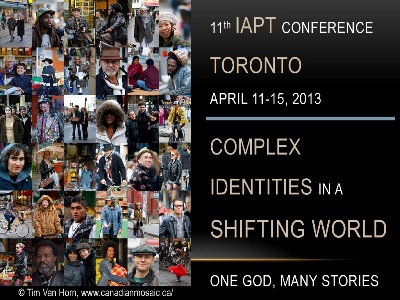2013 Toronto
11th Conference of the International Academy of Practical Theology (IAPT)
April 11-15, 2013
Toronto, Canada
We convene for the conference at the Old Vic building, behind Emmanuel College of Victoria University, which is located at 75 Queen’s Park Crescent, M5S1K7, near the Museum subway station. See the second logistics letter for détails (sent by email).
- Official Program (printable) (April 4)
- Official Program (screen version) (April 4)
- Artistic contributions to Toronto 2013 Conference!
Call for Papers and Roundtable Presentations
The largest city in Canada, Toronto considers itself one of the most multicultural cities of the world. The city touts diversity of “religion, race, and lifestyle,” with more than 100 spoken languages. About 52% of Torontonians are recent immigrants, and another 26% have at least one parent born outside of Canada.[1]But even among the 22% who have two Canadian parents or who are Canadian-born, “complex identity” exists, since Canada has long sought to negotiate among indigenous, French and English loyalties. Today more than ever, with two official languages, different aboriginal peoples and various currents of immigration, the country struggles to weave its many stories into a single national narrative.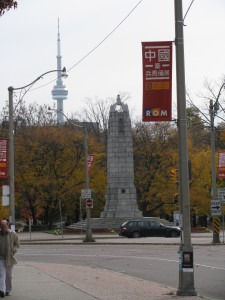
This local reality symbolically reflects a global context. Clear and well-defined identities are hard to sustain in a rapidly shifting world. Peoples, goods and cultures are on the move. Internet and other technologies increase the amount, the speed and the intensity of cultural exchanges between individuals, organizations and nations. Our contemporaries develop all kinds of strategies to define who they are in a world displaying different ideals, various ways of life and many models of organization. Religious traditions both collide and interact; many spiritual journeys cross religious boundaries. In a shifting world, those who believe in one God are elaborating different stories, and complex ones at that.
How do theological ideas and religious and spiritual practices help us negotiate this shifting world? What empirical, hermeneutical, liberation, indigenous or other methods help us understand, teach and further practical theological research in such a world?
While other theological disciplines may begin in theory or doctrine, practical theology in particular takes responsibility for the description of this world, its inhabitants, and the way it negotiates religious practices and theology. This conference will pay a particular attention to theological reflection on the stories by which individuals, groups and nations define themselves through time and space.
This conference invites papers on issues such as:
- Mosaic co-existence, multicultural interrelatedness and their effect on identity
- The migration of peoples, of goods, of money and of culture
- The influence and rights of “visible minorities”; the historical and current relationship between racialization and religion
- The way technology is changing the shape of communities, making international relationships more easily possible, but challenging intergenerational and interpersonal traditions and communal practices
- The extent to which people negotiate within themselves multiple loyalties to tradition, families of birth and choice, food, religious holidays and many other signifiers of complex identity
- The increasing importance of narrative as we attempt to communicate religious personal and communal meaning-making
- Impact of the these complex, shifting identities on how we understand the relationship between ecclesiology and practical theology
- The relationship of “religion” and “spirituality”—challenges to religious institutions and complexity in the marketplace of religious practices
- The rewriting of social narratives through cultural practices such as “truth and reconciliation commissions”
- The renegotiation of the use of land, when many groups tie their identity, livelihood, and religious traditions to the same land
- Identity formed by texts and practices, especially those deemed both sacred and revelatory
- Political proposals and the role of media in complex and shifting societies
- Changing identities in matters of race, gender and religion
- Crossing geographical boundaries or symbolic ones in individual or group journeys
Plenary Speakers from outside IAPT membership
Romin Tafarodi, University of Toronto, Canada
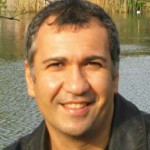 Romin Tafarodi is interested in the semiotic constructions and discursive practices through which people maintain a sense of personal identity. This approach to the self highlights the constitutive importance of language and culture. Currently, Dr. Tafarodi and his students are examining the acculturation of international students at the University of Toronto as reflected in their changing narrative identities, or the stories they tell about themselves. A separate line of research explores the cultural significance of the criteria by which students define a “good” life. Dr. Tafarodi is also involved in comparative research examining the perception of social reality in different cultural contexts. Finally, he is also interested in the philosophy of psychology and, more broadly, the philosophy and politics of science.
Romin Tafarodi is interested in the semiotic constructions and discursive practices through which people maintain a sense of personal identity. This approach to the self highlights the constitutive importance of language and culture. Currently, Dr. Tafarodi and his students are examining the acculturation of international students at the University of Toronto as reflected in their changing narrative identities, or the stories they tell about themselves. A separate line of research explores the cultural significance of the criteria by which students define a “good” life. Dr. Tafarodi is also involved in comparative research examining the perception of social reality in different cultural contexts. Finally, he is also interested in the philosophy of psychology and, more broadly, the philosophy and politics of science.
Kwok Pui Lan, Episcopal Divinity School, Cambridge, Massachusetts
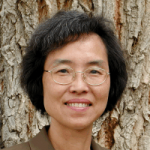 Dr. Kwok Pui Lan, William F. Cole Professor of Christian Theology and Spirituality, is an internationally known scholar and President of the American Academy of Religion in 2011. She received her doctorate from Harvard University and honorary doctorates from Kampen Theological University in the Netherlands and Uppsala University in Sweden. The author or editor of fifteen books in English and Chinese, Kwok’s publications include Postcolonial Imagination and Feminist Theology (Westminster John Knox); Introducing Asian Feminist Theology (Pilgrim); Discovering the Bible in the Non-Biblical World (Orbis Books); and Chinese Women and Christianity, 1860–1927 (Scholars Press). She is an editor of the major reference work Women and Christianity (4 vols., Routledge). Kwok was the recipient of the Award for Excellence in Teaching in 2009 from the American Academy of Religion. A cofounder of the network Pacific, Asian, North American Asian Women in Theology and Ministry, Kwok has held leadership roles in the Association of Theological Schools (ATS) and the Wabash Center for Teaching and Learning. She has spoken at the Episcopal Church’s House of Bishops conference and at ATS workshops, as well as delivered lectures across the United States, Asia, and Europe. Kwok is co-editor of the Reclaiming Liberation Theology Series of the SCM Press and serves on the boards of several journals.
Dr. Kwok Pui Lan, William F. Cole Professor of Christian Theology and Spirituality, is an internationally known scholar and President of the American Academy of Religion in 2011. She received her doctorate from Harvard University and honorary doctorates from Kampen Theological University in the Netherlands and Uppsala University in Sweden. The author or editor of fifteen books in English and Chinese, Kwok’s publications include Postcolonial Imagination and Feminist Theology (Westminster John Knox); Introducing Asian Feminist Theology (Pilgrim); Discovering the Bible in the Non-Biblical World (Orbis Books); and Chinese Women and Christianity, 1860–1927 (Scholars Press). She is an editor of the major reference work Women and Christianity (4 vols., Routledge). Kwok was the recipient of the Award for Excellence in Teaching in 2009 from the American Academy of Religion. A cofounder of the network Pacific, Asian, North American Asian Women in Theology and Ministry, Kwok has held leadership roles in the Association of Theological Schools (ATS) and the Wabash Center for Teaching and Learning. She has spoken at the Episcopal Church’s House of Bishops conference and at ATS workshops, as well as delivered lectures across the United States, Asia, and Europe. Kwok is co-editor of the Reclaiming Liberation Theology Series of the SCM Press and serves on the boards of several journals.
Antjie Krog, University of the Western Cape, South Africa
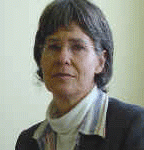 Antjie Krog, internationally acclaimed author of Country of my Skull , was appointed as an Extraordinary Professor in the Arts Faculty earlier this year. Krog, an accomplished Afrikaans poet, became well known as one of the SABC radio journalists who reported on the Truth and Reconciliation Commission hearings in the mid 1990s. Her best-selling book is an account of her TRC experience, and has recently been followed up by A Change of Tongue , a book that deals with South Africa’s recent social and cultural transformation. Both texts featured on the SA Library’s list of the ten most influential books published over the past ten years that focus on issues of democracy. As an Afrikaans writer translating her own work into English, Krog likes working on a multi-lingual campus. “But if you want to communicate to all South Africans, English is the language,” she insists. “I’m not an English writer, but a South African writer who writes in Afrikaans. Through translation I create an English with an Afrikaans sound which carries with it my heritage.” Krog has recently completed a biographical essay on J.M. Coetzee that will appear in a book edited by Kader Asmal on South Africa’s Nobel Prize winners. Krog is not daunted by the task of trying to coming to grips with Coetzee: “Writing is always a big risk. If you’re not prepared to be destroyed by the book it’s not good writing.” Prof. Krog’s presence at UWC has stimulated a variety of TRC related research. One of the projects she has assisted with is a retranslation of key TRC testimonies. A research team consisting of Ms Zannie Bock (Linguistics), Ms Nosisi Zantsi (Xhosa) and two Linguistics Honours students, Mr S. Metula and Mr N. Mazwi, have transcribed and translated the testimonies of two of the widows of “the Cradock Four”, which were originally given in Xhosa and simultaneously interpreted into English. A comparison of the new translation with that of the official TRC version has revealed a number of significant instances where the original meaning is lost, with implications for the historical record. The research was presented at the Intercultural Communication Conference at Stellenbosch University in September 2004.
Antjie Krog, internationally acclaimed author of Country of my Skull , was appointed as an Extraordinary Professor in the Arts Faculty earlier this year. Krog, an accomplished Afrikaans poet, became well known as one of the SABC radio journalists who reported on the Truth and Reconciliation Commission hearings in the mid 1990s. Her best-selling book is an account of her TRC experience, and has recently been followed up by A Change of Tongue , a book that deals with South Africa’s recent social and cultural transformation. Both texts featured on the SA Library’s list of the ten most influential books published over the past ten years that focus on issues of democracy. As an Afrikaans writer translating her own work into English, Krog likes working on a multi-lingual campus. “But if you want to communicate to all South Africans, English is the language,” she insists. “I’m not an English writer, but a South African writer who writes in Afrikaans. Through translation I create an English with an Afrikaans sound which carries with it my heritage.” Krog has recently completed a biographical essay on J.M. Coetzee that will appear in a book edited by Kader Asmal on South Africa’s Nobel Prize winners. Krog is not daunted by the task of trying to coming to grips with Coetzee: “Writing is always a big risk. If you’re not prepared to be destroyed by the book it’s not good writing.” Prof. Krog’s presence at UWC has stimulated a variety of TRC related research. One of the projects she has assisted with is a retranslation of key TRC testimonies. A research team consisting of Ms Zannie Bock (Linguistics), Ms Nosisi Zantsi (Xhosa) and two Linguistics Honours students, Mr S. Metula and Mr N. Mazwi, have transcribed and translated the testimonies of two of the widows of “the Cradock Four”, which were originally given in Xhosa and simultaneously interpreted into English. A comparison of the new translation with that of the official TRC version has revealed a number of significant instances where the original meaning is lost, with implications for the historical record. The research was presented at the Intercultural Communication Conference at Stellenbosch University in September 2004.
Aboriginal guests
We also are delighted to have as our honored guests three Aboriginal leaders who will facilitate our contextual learning experience:
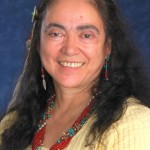 S. Eva Solomon, CSJ, is a sibling of S. Priscilla Solomon CSJ, a member of the Henvey Inlet First Nation and also a Sister of St. Joseph of Sault Ste Marie. She works from Winnipeg, MB for “Building Bridges Project”, an initiative the Assembly of Western Catholic Bishops’ Standing Committee on Aboriginal Affairs. The goals of the Building Bridges Project are: “to heighten awareness and understanding of interculturation of faith in the context of diocesan faith life; to help the broader Canadian Roman Catholic Church take on greater responsibility for ministry to Aboriginal Peoples; and to help Aboriginal Peoples recognize and take more ownership and responsibility for the faith life of their communities.” Eva seeks to help Aboriginal and non-Aboriginal people understand and reconcile with each other in our shared Canadian history. For most of her life, Solomon has been involved with interculturation of faith (integrating Catholic Faith with Aboriginal Spirituality) according to the teachings and documents of Vatican II and the Pontifical Congregation for Dialogue with Traditional Religions.
S. Eva Solomon, CSJ, is a sibling of S. Priscilla Solomon CSJ, a member of the Henvey Inlet First Nation and also a Sister of St. Joseph of Sault Ste Marie. She works from Winnipeg, MB for “Building Bridges Project”, an initiative the Assembly of Western Catholic Bishops’ Standing Committee on Aboriginal Affairs. The goals of the Building Bridges Project are: “to heighten awareness and understanding of interculturation of faith in the context of diocesan faith life; to help the broader Canadian Roman Catholic Church take on greater responsibility for ministry to Aboriginal Peoples; and to help Aboriginal Peoples recognize and take more ownership and responsibility for the faith life of their communities.” Eva seeks to help Aboriginal and non-Aboriginal people understand and reconcile with each other in our shared Canadian history. For most of her life, Solomon has been involved with interculturation of faith (integrating Catholic Faith with Aboriginal Spirituality) according to the teachings and documents of Vatican II and the Pontifical Congregation for Dialogue with Traditional Religions.
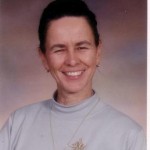 Priscilla Solomon CSJ is a Sister of St. Joseph of Sault-Ste Marie, currently living in North Bay, Ontario, Canada. She is Anishinabek, with Ojibway parents. She ministers in the Faith and Justice Office of her Congregation. Her work includes education and advocacy on issues such as poverty, human trafficking, ecological justice, and Aboriginal rights. She collaborates with or serves on committees in numerous faith-based justice related organizations.
Priscilla Solomon CSJ is a Sister of St. Joseph of Sault-Ste Marie, currently living in North Bay, Ontario, Canada. She is Anishinabek, with Ojibway parents. She ministers in the Faith and Justice Office of her Congregation. Her work includes education and advocacy on issues such as poverty, human trafficking, ecological justice, and Aboriginal rights. She collaborates with or serves on committees in numerous faith-based justice related organizations.
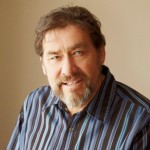 Harry Lafond is a member of the Muskeg Lake Cree Nation in Saskatchewan, Canada. His wife Germaine and himself have four grown up children and Damien who is 16 years old. He trained as a teacher and has taught at all levels with some years as Director of Education. From 1990 to 2000, he was chief of his community. Family is very important for him and he spends a lot of time with his children and grandchildren teaching them about their Cree heritage. He works very closely with the Catholic Church trying to build bridges of understanding between the Cree perspective and the Catholic perspective. Currently, he is the Executive Director for the Office of the Treaty Commissioner in Saskatchewan.
Harry Lafond is a member of the Muskeg Lake Cree Nation in Saskatchewan, Canada. His wife Germaine and himself have four grown up children and Damien who is 16 years old. He trained as a teacher and has taught at all levels with some years as Director of Education. From 1990 to 2000, he was chief of his community. Family is very important for him and he spends a lot of time with his children and grandchildren teaching them about their Cree heritage. He works very closely with the Catholic Church trying to build bridges of understanding between the Cree perspective and the Catholic perspective. Currently, he is the Executive Director for the Office of the Treaty Commissioner in Saskatchewan.
Artistic Contributions to “Complex Identities in a Shifting World: One God, Many Stories”
Eight local artists will come together to augment this theological event by responding visually to some of the conference issues. Their religious and cultural backgrounds are as varied as their voices. Their intentions include: invoking diverse and complementary spiritualities in creative dialogue; visualizing the co-existence of faith traditions; exploring personal identity in its temporal and physical dimensions; appraising the impact of distinct cultures on human life; and visiting the effects of immigration on a host nation.
Art is a common language of all. By reflecting on conference issues through drawing, painting, and sculpture, these artists hope to transcend differences of age, origin, tradition, and media. They aim to engage, connect, and communicate theologically and spiritually.
The IAPT art exhibit will be hosted by Regis College and included as part of the Regis in the Arts annual Lenten/Easter exhibit.
The artists are Muhammad Irfan Aziz, Linda Chen, Alexey Dreva, David Holt, Tai Kim, Florica Laslau, Michael Stoeber, and Angela Tamara.
The show will run Tuesday, April 2nd through Monday, April 15th, 2013. The reception for the exhibit will be Friday, April 12th, 5:30-8pm.
We are grateful to Pamela Couture, Program Committee Chair, Robert Mager, and all the members of the hard-working local planning team for their excellent work.
Guests: IAPT has a liberal policy for inviting guests. If you wish to attend IAPT but you are not a member, you will need to request that a member who knows you nominate you for participation as a guest. That nomination should be sent to torontoconference2013@gmail.com. Your letter of invitation from IAPT and instructions for online registration will be sent when the nomination has been accepted. The nomination process through a member is necessary to verify that guests have the requisite academic qualifications. As some participants need to obtain a visa in order to attend, this verification process is necessary. Thank you for your understanding.
